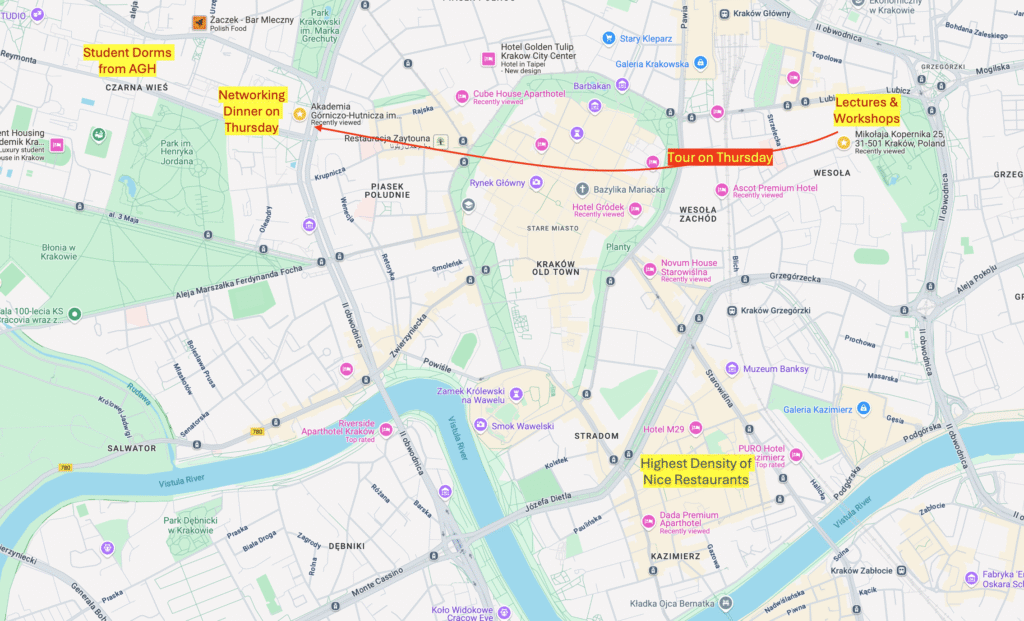Venues
The 4-day lecture and workshop program (including the talks from the EIC event on Thursday) will be held at
Instytut Pielęgniarstwa i Położnictwa CMUJ (Mikołaja Kopernika 25, 31-501 Kraków, Poland)
The networking dinner event on Thursday will be held at
the main building of AGH University of Science and Technology (al. Adama Mickiewicza 30, 30-059 Kraków, Poland)

Accommodation Suggestions
There are plenty of affordable hotels and apartments in Kraków. Anything around the old town and the Jewish quarter would be fine.
The AGH university also rents out student dormitories, as our summer school takes place during the university holiday https://taniehostele.pl/en.
Public Transport in Kraków
Kraków has a well-developed and reliable public transport system, primarily consisting of trams and buses operated by MPK Kraków. The network covers the city and surrounding areas, with frequent connections between key districts, including the Old Town, Kazimierz, and Nowa Huta.
Tickets are time-based (e.g. 20, 50, 90 minutes) or valid for a day or longer, and must be validated upon boarding. They can be purchased at kiosks, ticket machines (most accepts card payments), or via mobile apps like Jakdojade or moBILET. Night buses operate on major routes after midnight.
Trams are often the fastest and most efficient way to travel in central Kraków, especially during peak hours when roads may be congested.
Google Maps works well for planning connections. Trams are usually the fastest option in the city.
To get from Kraków Airport to the city centre, you can take:
- A train (~20 minutes to Kraków Główny)
- A bus (lines 209, 300 by day; 902 at night – please confirm the bus lines with official site)
Practical Tips
Polish is the official language of Kraków and Poland. While English is widely spoken in tourist areas, especially by younger people and service staff, learning a few basic Polish phrases can enhance your experience and interactions.
Poland’s currency is the Polish złoty (PLN). Credit and debit cards are widely accepted, and contactless payments are standard. However, it’s a good idea to carry some cash—especially coins—for small purchases or older ticket machines. ATMs are easy to find.
Tap water is safe to drink across the country.
Tipping in restaurants isn’t mandatory, but a 10% tip is appreciated if service isn’t already included in the bill.
Free Wi-Fi is available in many public places, cafés, and hotels.
Poland is generally a safe country, with a low rate of petty crime, though standard travel precautions still apply.
Things to do in Krakow
Kraków is a historic city in southern Poland known for its well-preserved medieval architecture and cultural heritage. It offers a wide range of activities for visitors with different interests.
- Old Town (Stare Miasto): The central district contains many landmarks, including the Main Market Square (Rynek Główny), St. Mary’s Basilica, and the Cloth Hall. The area is walkable and features historic buildings, churches, restaurants and cafés.
- Wawel Castle and Cathedral: Located on Wawel Hill near the Vistula River, these sites are significant in Polish history. Visitors can see royal chambers, tombs of historical figures, and collections of art and artifacts.
- Kazimierz District: Formerly a separate town, this neighborhood has Jewish historical sites, synagogues, and cemeteries. Today, it is also known for its restaurants, bars, and cultural events.
- Museums: Kraków has a variety of museums, such as:
- Schindler’s Factory Museum, focusing on World War II history
- MOCAK, Museum of Contemporary Art
- Czartoryski Museum, featuring art and historical objects, including works by Leonardo da Vinci
- Vistula River: The river area is suitable for walking, biking, or sitting in open spaces. In warmer months, boats and floating cafés operate along the riverbanks.
- Excursions: From Kraków, visitors often take day trips to places such as:
- Wieliczka Salt Mine, a historic underground site
- Auschwitz-Birkenau Memorial and Museum
- Zakopane and the Tatra Mountains for hiking
Polish Food
Polish cuisine is hearty and seasonal, based largely on meat, potatoes, cabbage, and grains. Traditional dishes are widely available in restaurants and often reflect regional variations. Vegetarian options exist but may be limited in more traditional venues. Meals are typically filling, simple, and rooted in home-style cooking.
Traditional Dishes
- Pierogi – Dumplings filled with cheese and potato, meat, mushrooms, or fruit.
- Bigos – Sauerkraut and meat stew, often slow-cooked.
- Żurek – Sour rye soup with sausage and egg, sometimes served in bread.
- Gołąbki – Cabbage rolls stuffed with rice and minced meat.
- Placki ziemniaczane – Potato pancakes, served with sour cream or sauce.
Sausages and Dairy
Poland is known for its variety of kiełbasa (sausages) and twaróg (curd cheese), used in both savoury and sweet dishes.
Bread
Bread plays a central role in Polish meals, especially rye bread and sourdough-based loaves. It’s commonly eaten with butter, cheese, cold cuts, or soups.
Desserts
Popular sweets include sernik (cheesecake), makowiec (poppy seed roll), and pączki (filled doughnuts).
Drinks
A traditional non-alcoholic drink is kompot—a sweet beverage made by simmering seasonal fruits (like apples, berries, or rhubarb) in water. Tea and coffee are common, and vodka or local beers are often served on social occasions.